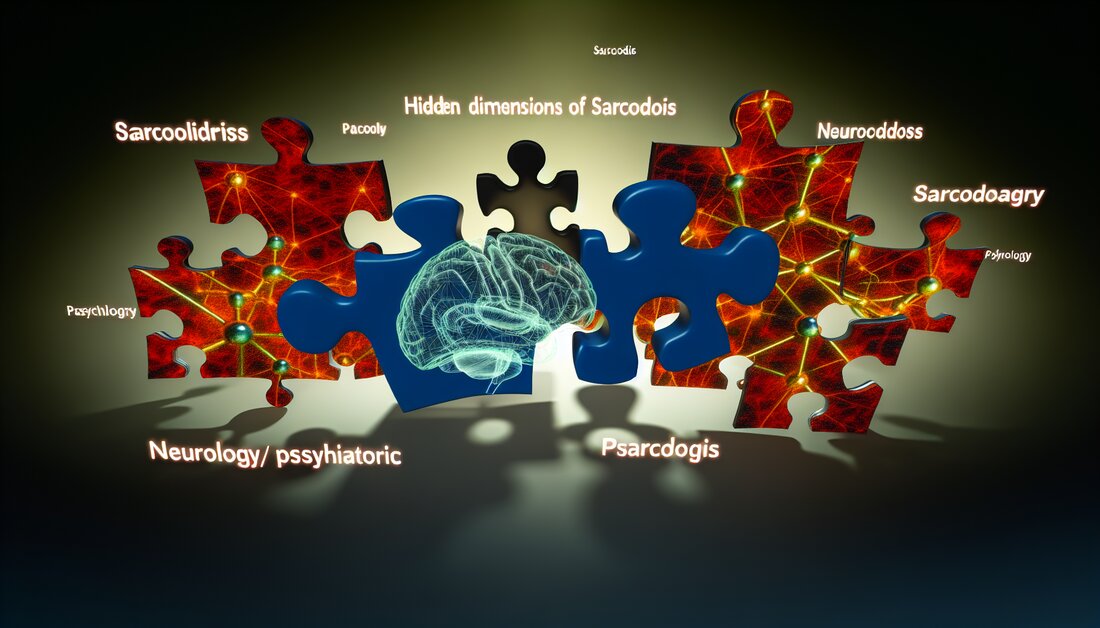Hidden dimensions of sarcoidosis: Neuropsychiatric mysteries revealed
Neurologists show: Neuropsychiatric symptoms in sarcoidosis are often underestimated. Study highlights importance of holistic treatment. Insights gathered through Pubmed research.

Hidden dimensions of sarcoidosis: Neuropsychiatric mysteries revealed
Neurosarcoidosis (NS) is a disease that has gained more attention in recent years. It is a special form of sarcoidosis, an inflammatory disease that often affects the connective tissue in the body. While sarcoidosis is well known, the specific manifestation in the nervous system, called NS, is not always immediately recognized. NS can occur either along with other sarcoidosis symptoms or as a sole form of the disease.
In a new study, researchers examined the challenges of NS and how it can be diagnosed and treated. A key finding of this research is that NS can have not only physical but also psychological and social effects. Recognizing the main symptoms, which are both neuropsychiatric in nature, i.e. affecting the nervous system and the psyche, is considered essential for comprehensive treatment.
The diagnosis of NS is based on a combination of clinical symptoms, imaging techniques and special tissue analyzes that reveal so-called granulomatous inflammations (non-caseating and non-necrotic granulomas). However, according to the study, there is an urgent need for further research, particularly to better assess and treat psychological effects, such as anxiety or depression. This could lead to future treatment approaches increasingly including psychological support.
A primary goal of this research is to increase awareness of the neuropsychiatric manifestations of sarcoidosis. By better understanding these symptoms, doctors can develop holistic treatment approaches that address both the physical and psychological needs of patients.
Basic terms and concepts:
Neurosarcoidosis (NS):A specific form of sarcoidosis that affects the nervous system.
Sarcoidosis:An inflammatory disease that typically affects connective tissue.
Granulomas:Small clusters of inflammatory cells that form in tissues.
Non-caseating and non-necrotic granulomas:Special type of granulomas that do not contain decomposition products (necrosis).
Neuropsychiatric symptoms:Symptoms affecting both the nervous system and mental health.
Abbreviations:
- NS: Neurosarkoidose
- PMC: Pubmed Central
Neurosarcoidosis: Major neuropsychiatric symptoms and diagnostic challenges
The present research highlights significant advances in the understanding of neurosarcoidosis (NS) as a distinct disorder. NS represents a heterogeneous spectrum of clinical and radiological changes that can affect patients with systemic sarcoidosis or occur in isolation.
Background and research approach
The health challenges posed by NS and sarcoidosis in general extend beyond their physical symptoms and include a variety of psychosocial factors. Therefore, recognition of key neuropsychiatric symptoms is useful in the treatment of NS patients. To carry out the study, extensive database searches were carried out in Pubmed, Medline and Pubmed Central (PMC). ( https://pubmed.ncbi.nlm.nih.gov/39723989 )
Results and discussion
The correct diagnosis of NS is based on a combination of clinical presentation, imaging features, and histopathological evidence of non-caseating and non-necrotizing granulomas. Analysis of the current literature shows that specific case-control, cohort and clinical studies on the psychiatric manifestations of sarcoidosis are needed. Psychological stress, especially emotional stress such as anxiety or depression, is often underestimated.
Research into the neuropsychiatric manifestations of sarcoidosis is crucial to increase awareness of this disease among clinicians. This enables a holistic approach that takes both physical and psychological aspects into account. Ultimately, an integrative treatment strategy should improve the quality of life of patients.
conclusion
The research highlights the need to bring the neuropsychiatric components of neurosarcoidosis into the focus of clinical investigations and treatments. A deeper insight into these symptoms could lead to improved diagnostics and the development of new therapeutic approaches.

 Suche
Suche
 Mein Konto
Mein Konto
